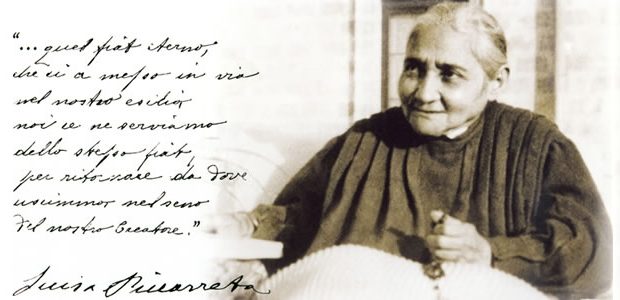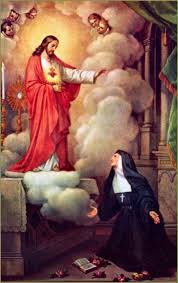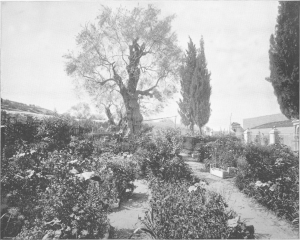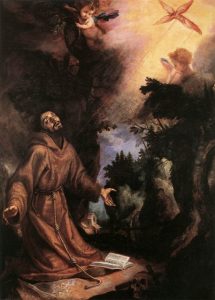[pdf-embedder url=”http://luisapiccarreta.me/wp-content/uploads/2016/10/national-novena-TO-THE-IMMACULATE-CONCEPTION.pdf” title=”national-novena-to-the-immaculate-conception”]
Month: October 2016
Some of the Promises of Jesus for Whoever Prays The Hours of the Passion
[pdf-embedder url=”http://luisapiccarreta.me/wp-content/uploads/2016/10/Promises-of-Jesus-for-Whoever-Prays-The-Hours-of-the-Passion1.pdf” title=”promises-of-jesus-for-whoever-prays-the-hours-of-the-passion1″]
St. Margaret Mary Alacoque, – OCTOBER 16
St. Margaret Mary Alacoque
St. Margaret Mary was born in Lauthecourt, France, on July 22, 1647, and entered the convent of the Visitation nuns at Paray-le-Monial in 1671. From 1673 to 1675, she was especially favored by God with mystical graces and revelations of the Sacred Heart of Jesus. Our Lord made three requests of her: (1) to spread devotion to his Sacred Heart; (2) to promote the practice of receiving Holy Communion on the first Fridays and of keeping a Holy Hour of reparation; and (3) to establish a special feast in honor of his Sacred Heart. When she tried to comply with our Lord’s instructions, she at first met opposition from her superiors and sisters.
But when St. Claude La Colombière arrived in Paray to be the sisters’ confessor, Sr. Margaret Mary informed him of our Lord’s revelations, and he assured her that these were, indeed, from God and that he would assist her in realizing our Lord’s requests. With the eventual appointment of a new superior of the convent, Sr. Margaret Mary was made mistress of novices. In this role, she was able to spread the devotion among the younger sisters. In 1686, the feast of the Sacred Heart was celebrated in the convent for the first time, and two years later a chapel was dedicated to the Sacred Heart. Devotion thus began to spread to other religious houses, and from there throughout France and eventually the world. St. Margaret Mary died on October 17, 1690, and was canonized by Pope Benedict XV in 1920.
NewsLetter from Official Web Site
XXIX Sunday of Ordinary Time
The arms outstretched and the cry “day and night”.
10/13/2016

Dear brothers and sisters, Fiat!
In the parable of today’s Gospel, Jesus links indissolubly two important themes for the Christian life: the need and insistence of prayer. The importance of praying with insistence seems to be the main theme of the parable of the unjust judge. As he fulfills the constant demands of the widow so the Father will be ready to grant our prayers. We can develop this theme with the important elements that Jesus provides in the same parable. The choice of characters, for example, is significant.
The widow is a person who hadn’t many social protections as today we might call them. The Mosaic law had tried to give some protection for widows and other underprivileged people such as orphans and foreigners. In the Acts of the Apostles, the appointment of deacons arose precisely in relation to the lack of attention towards the widows.
Unceasing prayer, lived in faith, but especially with the offering of one’s whole life, wins God. Several times Luisa, in her prayer, was very insistent with Jesus who eventually, almost to the point of exhaustion, gave in to her requests, but everything was offered and lived in the Divine Will
In the passage of August 12, 1927, Luisa presents the experience of how the intercession prayer is powerful, through what Jesus says to her about the manifestation of the Kingdom of the “Fiat”.
Luisa’s interior is a continuous speaking before God, and a continuous act. And a speaking ever unceasing before God, wanting the Kingdom of the Divine Fiat, brings with itself the certainty of victory.
So, either Luisa has won or she is about to win. A continuous doing and speaking acquires the nature of a winning power before God, and it is as if God would lose the resisting strength, while the soul acquires the winning strength. An exchange takes place: God is disarmed and the soul is armed with divine weapons, but the Supreme Being is not given to being able to resist.
Does that asking Him continuously for the Kingdom of the Eternal Will seem trivial to us? – going around through the whole Creation, and, over and over again, in all the acts Jesus did in Redemption, as well as in the seas of the acts of love and of sorrow of the Sovereign Queen of Heaven, to ask for the Kingdom of God?
Luisa sought nothing for herself, and she went round and round, asking over and over again that the Divine Will be known, and that It dominate and reign. Not a shadow of what is human enters into this, nor any personal interest; it is the holiest and most divine prayer and act; it is prayer of Heaven, not of the earth, and therefore the purest, the most beautiful, the invincible one, which encloses only the interest of the divine glory.
Until now no one has prayed Jesus with such insistence.
The Virgin Mary prayed Him with such insistence for the sake of Redemption, and She was victorious; but for the Kingdom of the Divine Will – no one until now with such insistence as to conquer a God. Therefore, Luisa’s insistence says much, the very uproaring of all nature says much. In these times, all the elements, uproaring, are bearers of goods, and this is necessary to reorder the Kingdom of the “Fiat”. It is the greatest thing, and it takes the uproaring in order to purify the earth. Therefore, Jesus doesn’t want Luisa to oppress herself too much, but rather she keeps on with her continuous flight, with her insistence, so as to acquire the complete strength to win the Kingdom of the Supreme Fiat.”
We might ask ourselves: today, who cries out to the Lord, day and night, one’s sorrow?
Jesus says: You must pray continually. Certainly we, every so often, pray, we say prayers, we think about the Lord. But what does the expression “always to pray and not lose heart” mean ? We find that through the several moments of prayer we learn to love and it’s love that is the true prayer and we can love forever.
Today we meditate and deepen the theme of prayer, although it is better to talk little about it and dedicate ourselves to prayer, to give our time and heart for the encounter with the Lord. I would like also ask myself and each one of you: ” Do I really wish to learn to pray, or do I consider prayer as something boring, useless? Am I ready to make progress in prayer, by planning precise timetables for prayer, by helping myself with supports, by searching for the essential of prayer, the core, that is a true love relationship with the Lord? “
If my wish is sincere, “Lord teach me to pray,” if I have this desire, if I am willing to change attitudes, lifestyles, schedules, the Lord will transform my spiritual life and help me. Since, as someone said, “learning to pray is learning to live”; “Prayer is the breath of the soul”; “Prayer is God’s power in our lives, it’s God’s Omnipotence placed in our hands, in our faith.”
Jesus told his disciples this parable, about the need to pray always, without tiring.
Moses who prays, standing on top of the hill, becomes the model of constancy in prayer. He is the intercessor. The people is in desperate need of his constant prayer. This let us understand that prayer is the support for action and that the claim to change the world, on our own, is an illusion. A psalm says: ” Unless the Lord builds the house, the builders labor in vain. Unless the Lord watches over the city, the guards stand watch in vain”.
Msgr. Câmara, a tireless apostle of the poor in Brazil, says: “Two hands clasped get much more than two clenched fists.” These are the words of a very active man and they are confirmed by many examples.
Saint Teresa of Calcutta openly confessed: ” I can do nothing without prayer”! She did a lot, but knew and recognized that everything started from prayer. Prayer requires perseverance and commitment. To Pray well, pray with confidence, pray without ever growing tired: to pray when it gives joy, pray when we find difficult, this is the teaching of Jesus. In this way, we nourish our faith, we welcome the salvation of the Lord.
don Marco
The Garden of Gethsemane
The Garden of Gethsemane
For nearly sixteen hundred years this Garden of Gethsemane, in the Valley of Kedron, has been fixed by the devout as the place of the prayer of our Savior at the time of his “agony” just before his death. John says: “Jesus went forth with his disciples over the brook Kedron, where was a garden into which He entered with his disciples.” Mark says: “And they came to the place which was named Gethsemane, and He said to his disciples, Sit ye here while I shall pray.” Since the days of the visit of the Empress Helena to Jerusalem, in the fourth century, this garden has been identified by tradition. The Valley of Kedron (Jehoshaphat) is here deep and narrow, and Gethsemane occupies about an acre of ground, to the north of which are rugged and barren heights in which the kings of Jerusalem are buried. To the west are the massive walls of Jerusalem. To the east, and rising directly above it about three hundred feet, is the Mount of Olives. The Valley of the Kedron falls into a deep ravine to the south. We have above a view of the garden within, taken by our artist on the 27th of April, 1894. It is a beautiful spot; the trees are very venerable, although they can not have been the identical trees which overshadowed the Son of Man in that hour of his distress. Those who are familiar with Eastern life will easily understand that Christ would often find rest and sleep and opportunity for devotion on the hillside and under the open canopy of heaven. “Nearly all the inhabitants of Palestine sleep, during the greater part of the year, in the open air.”
From the Hours of the Passion:
Fifth Hour From 9 to 10 PM – First Hour of Agony in the Garden of Gethsemane
Sixth Hour From 10 to 11 PM – Second Hour of Agony in the Garden of Gethsemane
Seventh Hour From 11 PM to Midnight – Third Hour of Agony in the Garden of Gethsemane
PRAYING FOR MERCY IN THE DIVINE WILL – Oct. 7th, 2016
[pdf-embedder url=”http://luisapiccarreta.me/wp-content/uploads/2016/10/2016-October-7th-PRAYER-OF-MERCY.pdf” title=”2016-october-7th-prayer-of-mercy”]
Reflections on the Rounds
St. Francis: Canticle of the Sun
Most High, all powerful, good Lord,
Yours are the praises, the glory, the honor,
and all blessing.
To You alone, Most High, do they belong,
and no man is worthy to mention Your name.
Be praised, my Lord, through all your creatures,
especially through my lord Brother Sun,
who brings the day; and you give light through him.
And he is beautiful and radiant in all his splendor!
Of you, Most High, he bears the likeness.
Praise be You, my Lord, through Sister Moon
and the stars, in heaven you formed them
clear and precious and beautiful.
Praised be You, my Lord, through Brother Wind,
and through the air, cloudy and serene,
and every kind of weather through which
You give sustenance to Your creatures.
Praised be You, my Lord, through Sister Water,
which is very useful and humble and precious and chaste.
Praised be You, my Lord, through Brother Fire,
through whom you light the night and he is beautiful
and playful and robust and strong.
Praised be You, my Lord, through Sister Mother Earth,
who sustains us and governs us and who produces
varied fruits with colored flowers and herbs.
Praised be You, my Lord,
through those who give pardon for Your love,
and bear infirmity and tribulation.
Blessed are those who endure in peace
for by You, Most High, they shall be crowned.
Praised be You, my Lord,
through our Sister Bodily Death,
from whom no living man can escape.
Woe to those who die in mortal sin.
Blessed are those whom death will
find in Your most holy willl,
for the second death shall do them no harm.
Praise and bless my Lord,
and give Him thanks
and serve Him with great humility.
AMEN




